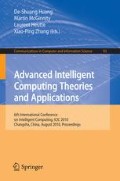Abstract
Collision detection is very important for improving the truth and immersion in the virtual environment. The paper analyzes the problems that exist in the normal algorithm. And there is no algorithm which is suitable to every situation. And the more complex the situations are, the more inefficient the algorithm is. The paper converts the problem of the collision detection to the non-linear programming problem with restricted condition. And use the modified quantum genetic algorithm to solve this problem. The results show that this method is efficient, especially in large-scale scenes.
Access this chapter
Tax calculation will be finalised at checkout
Purchases are for personal use only
Preview
Unable to display preview. Download preview PDF.
References
Narayanan, A., Moore, M.: Quantum Inspired Genetic Algorithms. In: Proceedings of the 1996 IEEE International Conference on Evolutionary Computation (ICEC 1996), Nogaya, Japan, pp. 41–46. IEEE Press, Los Alamitos (1996)
Han, K.H.: Genetic Quantum Algorithm and its Application to Combinatorial Optimization Problem. In: Proceedings of IEEE the 2000 Congress on Evolutionary Computation, San Diego, USA, pp. 1354–1360. IEEE Press, Los Alamitos (2000)
Wang, Y.P., Li, Y.H.: A Novel Quantum Genetic Algorithm for TSP. Journal of Computer Science and Technology 30(5), 748–755 (2007)
Wei, Y.M., Wu, Y.Q., Shi, J.-Y.: Research on Fixed Direction Hull Bounding Volume in Collision Detection. Journal of Software 12(7), 1056–1063 (2001)
Hubbudm, P.M.: Approximation Ployhedra with Sphere for Time-critical Collision Detection. ACM Trans. Graph. 15(3), 179–210 (1996)
Liu, C.A., Wang, Y.P.: Evolutionary Algorithm for Constrained Multi-Objective Optimization Problems and its Convergence. Systems Engineering and Electronic Technology 29(2), 277–280 (2007)
Ye, E.H., Zhang, D.: Probability and Stochastic Process, pp. 78–103. Science Press, Beijing (2005)
Li, S.Y., Li, P.C.: Quantum Genetic Algorithm Based on Real Encoding and Gradient Information of Object Function. Journal of Harbin Institute of Technology 38(8), 1216–1218, 1223 (2006)
Author information
Authors and Affiliations
Editor information
Editors and Affiliations
Rights and permissions
Copyright information
© 2010 Springer-Verlag Berlin Heidelberg
About this paper
Cite this paper
Wu, J., Chen, L., Yang, L., Peng, L. (2010). Research of Modified Quantum Genetic Algorithm and It’s Application in Collision Detection. In: Huang, DS., McGinnity, M., Heutte, L., Zhang, XP. (eds) Advanced Intelligent Computing Theories and Applications. ICIC 2010. Communications in Computer and Information Science, vol 93. Springer, Berlin, Heidelberg. https://doi.org/10.1007/978-3-642-14831-6_6
Download citation
DOI: https://doi.org/10.1007/978-3-642-14831-6_6
Publisher Name: Springer, Berlin, Heidelberg
Print ISBN: 978-3-642-14830-9
Online ISBN: 978-3-642-14831-6
eBook Packages: Computer ScienceComputer Science (R0)

